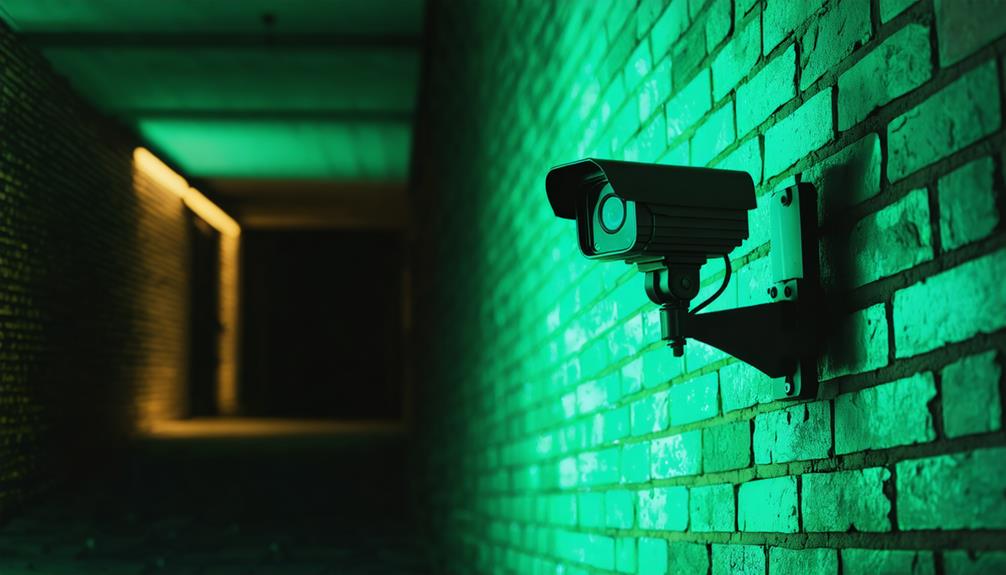
Brainstorm Security Shop

For Orders Over $99

On Any Of Our Products

Details On Refund Page

When you think about enhancing your security, a night vision security camera might not be the first option that comes to mind. However, these devices can significantly improve your surveillance capabilities, especially in low-light conditions. With their ability to capture clear images in complete darkness, they offer peace of mind for both residential and commercial properties. But not all night vision cameras are created equal; understanding their technology and features is crucial for making the right choice. So, what should you know before investing in one? Let’s explore the key aspects that could impact your decision.
Night vision technology allows you to see clearly in low-light conditions, transforming darkness into visibility. This technology primarily relies on infrared technology, which detects and amplifies the light that’s invisible to the naked eye. By capturing this infrared light, night vision devices enhance your ability to view your surroundings, even in complete darkness.
You might be surprised to learn how widely this technology is used, especially in various surveillance applications. Whether it’s for home security, wildlife monitoring, or military operations, night vision cameras play a crucial role in ensuring safety and awareness. You can monitor your property effectively, keeping an eye on any suspicious activity without revealing your presence.
The core principle behind night vision involves converting ambient light into a visible image. In scenarios with minimal light, the technology can help you identify shapes, movements, and details that you wouldn’t otherwise see. This capability provides you with a significant advantage whether you’re securing your home or conducting a surveillance mission.
Night vision cameras offer enhanced low-light surveillance, allowing you to monitor your property effectively even in complete darkness. This capability not only keeps you informed but also serves as a strong deterrent against potential intruders.
Knowing you have this technology in place can give you peace of mind and improve your overall security.
When the sun sets and darkness envelops your property, enhanced low-light surveillance becomes crucial for ensuring safety and security. Night vision cameras are designed to provide you with the peace of mind you need, even in the darkest conditions. With their impressive night vision range, you can monitor your surroundings without missing a detail.
Here’s a quick comparison of the benefits you’ll experience with night vision cameras:
| Feature | Benefits |
|---|---|
| Night Vision Range | Covers large areas at night |
| Image Clarity | Clear visuals in low light |
| Versatile Applications | Ideal for homes and businesses |
Using these cameras, you’ll notice significant improvements in image clarity, allowing you to identify people, vehicles, or potential threats with ease. No more worrying about poor visibility; night vision cameras utilize advanced technology to ensure you see everything clearly, regardless of the hour. Investing in enhanced low-light surveillance not only strengthens your security but also provides you with confidence in your safety measures. So, don’t wait until it’s too late—consider upgrading your surveillance system to include night vision capabilities today!
How can a well-placed night vision camera act as a powerful deterrent against intruders? The mere presence of these cameras enhances your home’s security by sending a clear message to potential criminals: you’re watching. When intruders see a night vision camera, they’re more likely to think twice before attempting a break-in, knowing that their actions are being recorded, even in low-light conditions. This aspect of intruder prevention is crucial in crime deterrent strategies.
Night vision cameras provide you with the protection you need during the night when most break-ins occur. They allow you to monitor your property around the clock, ensuring nothing goes unnoticed.
Additionally, the footage captured can serve as vital evidence should a crime occur, aiding law enforcement in their investigations.
When choosing a night vision camera, you’ll encounter several types, each suited for different needs.
Infrared night vision, thermal imaging cameras, and low-light surveillance options all have unique capabilities that can enhance your security.
Let’s explore how each type can benefit your surveillance setup.
Infrared night vision technology enables you to monitor your surroundings in complete darkness, providing enhanced security for both residential and commercial properties. By utilizing IR illuminators and advanced infrared technology, these cameras allow you to see what others can’t, ensuring you’re always aware of potential threats.
Here’s a quick look at the different types of infrared night vision cameras you might consider:
| Type | Description |
|---|---|
| Standard IR Cameras | Use IR illuminators to capture clear images in low light. |
| Covert Surveillance | Discreet designs that blend into the environment for unobtrusive monitoring. |
| High-Resolution Models | Offer superior clarity, making it easier to identify details in complete darkness. |
| Wireless Options | Provide flexibility in placement without the hassle of wiring. |
With these options, you can choose the best fit for your security needs. Whether you need standard night vision or covert surveillance, infrared night vision cameras give you the power to monitor effectively, day or night. Take control of your safety with the right night vision technology!
Thermal imaging cameras are a vital tool in modern security systems, offering a unique way to detect heat signatures from people, animals, and objects in complete darkness. These cameras excel in outdoor monitoring, making them indispensable for various security applications.
Here are four key benefits of using thermal imaging cameras:
With these features, thermal imaging cameras enhance your security setup, providing peace of mind whether you’re monitoring your home, property, or a larger area. Their effectiveness in capturing heat signatures makes them an ideal choice for anyone serious about safety and security.
For effective low-light surveillance, choosing the right type of night vision camera is crucial. You have several options to consider, each catering to specific needs.
First, infrared (IR) cameras are popular for their ability to capture high-resolution images in total darkness. These cameras use infrared light, which is invisible to the naked eye, allowing you to see clearly even when there’s no ambient light.
Another option is low-light cameras, designed to amplify existing light. While they don’t require complete darkness, they excel in dimly lit environments, providing clear images without the need for additional lighting.
If you want to keep an eye on your property remotely, look for cameras that support remote monitoring. This feature allows you to access live feeds from anywhere via your smartphone or computer, adding convenience to your security system.
Lastly, consider hybrid options that combine IR and low-light technology, giving you the best of both worlds. By assessing your specific surveillance needs, you can select the right night vision camera to enhance your security and ensure peace of mind, even in low-light conditions.
When choosing a night vision security camera, it’s essential to focus on several key features that can make a significant difference in performance. To ensure you get the best surveillance experience, keep an eye on these important aspects:
Properly installing your night vision security camera is crucial for optimal performance and coverage. Start by selecting a location that offers a clear view of the area you want to monitor. Avoid placing the camera near bright lights or reflective surfaces, as these can interfere with its night vision capabilities.
Use these installation tips to enhance your setup:
First, mount the camera at least 8 to 10 feet off the ground to minimize tampering while ensuring a broad field of view.
Second, consider the angle of the camera—position it to capture potential entry points, such as doors and windows.
Incorporate smart positioning strategies by ensuring that the camera covers areas with minimal obstructions. If possible, avoid pointing it directly at walls or fences.
Additionally, ensure the camera is protected from the elements if it’s outdoors, as weather can affect performance.
Choosing the right night vision security camera can significantly enhance your home’s security. With so many options available, it’s crucial to consider factors like image quality, range, and user feedback. Here are some top recommendations based on night vision reviews:
When selecting a camera, always check night vision reviews to ensure you’re making an informed decision. A good night vision camera not only protects your home but also gives you peace of mind.
Yes, night vision cameras can work in complete darkness. Their night vision range enhances low light performance, allowing you to see clearly even when there’s no visible light. You’ll appreciate the detail captured in total darkness.
Battery life varies widely, but you can expect several hours to days depending on power consumption and usage. Regular maintenance improves durability, ensuring your device remains functional longer and maximizes its overall battery performance.
Yes, many cameras have a weatherproof rating, ensuring they withstand rain and snow. When installing, choose locations sheltered from harsh elements and follow manufacturer guidelines to maximize durability and performance in outdoor conditions.
Yes, you can access your camera remotely. With proper connectivity, you’ll enjoy mobile access, enhancing your surveillance capabilities. Just ensure your device’s app is installed and connected to the internet for seamless monitoring anytime, anywhere.
When comparing infrared vs thermal night vision technology, infrared focuses on visible light and can provide higher resolution images. Thermal detects heat signatures, offering broader visibility in complete darkness but usually with lower resolution.
Brainstorm Security Shop
1867 Caravan Trail
Ste 105
Jacksonville, FL 32216
Call us toll free: (800) 859-5566